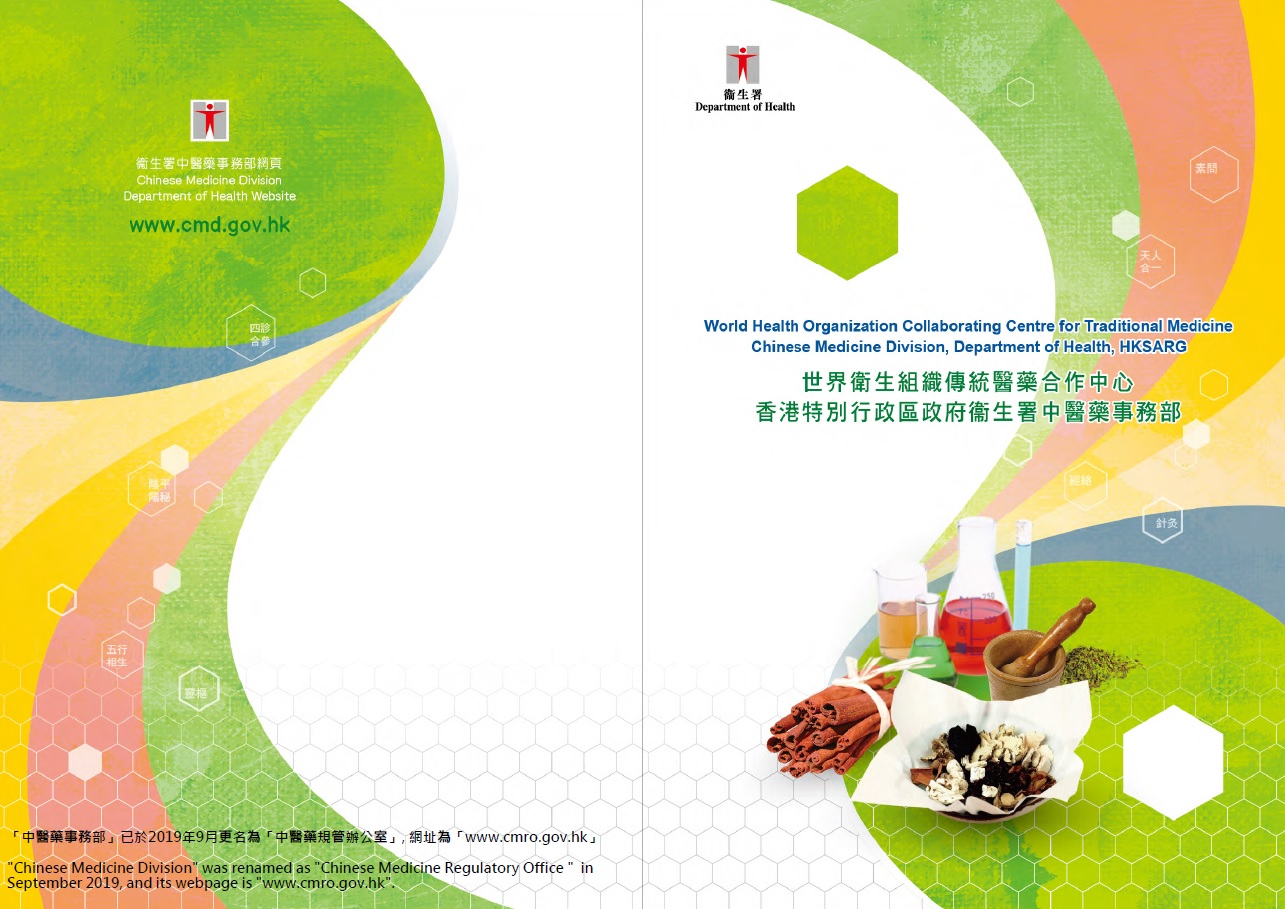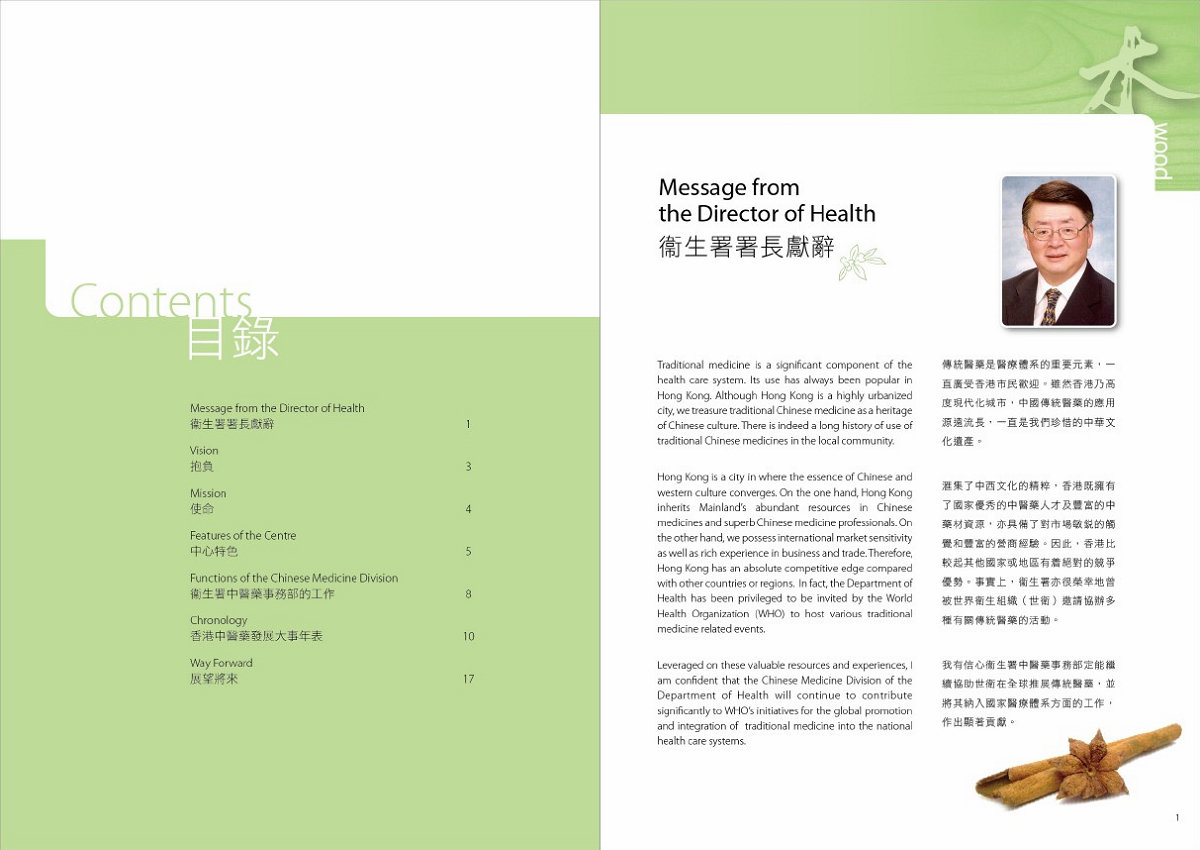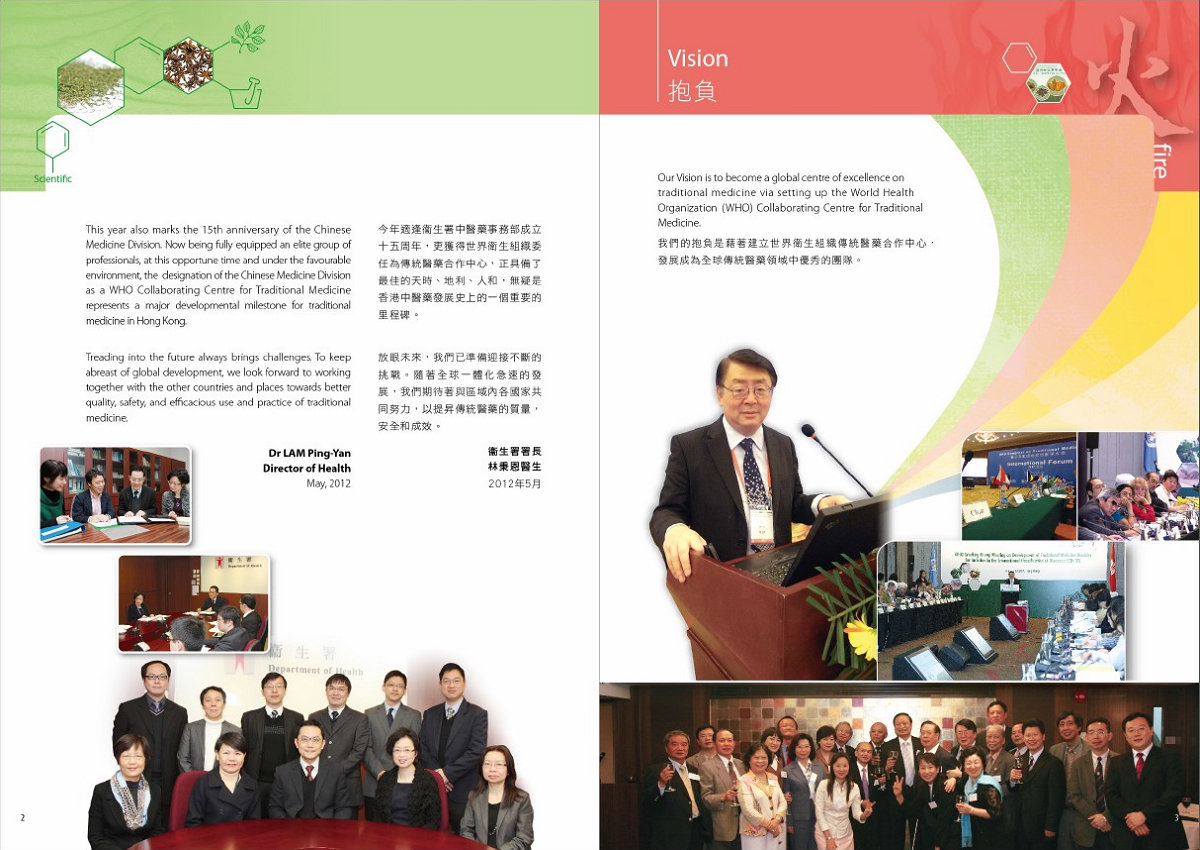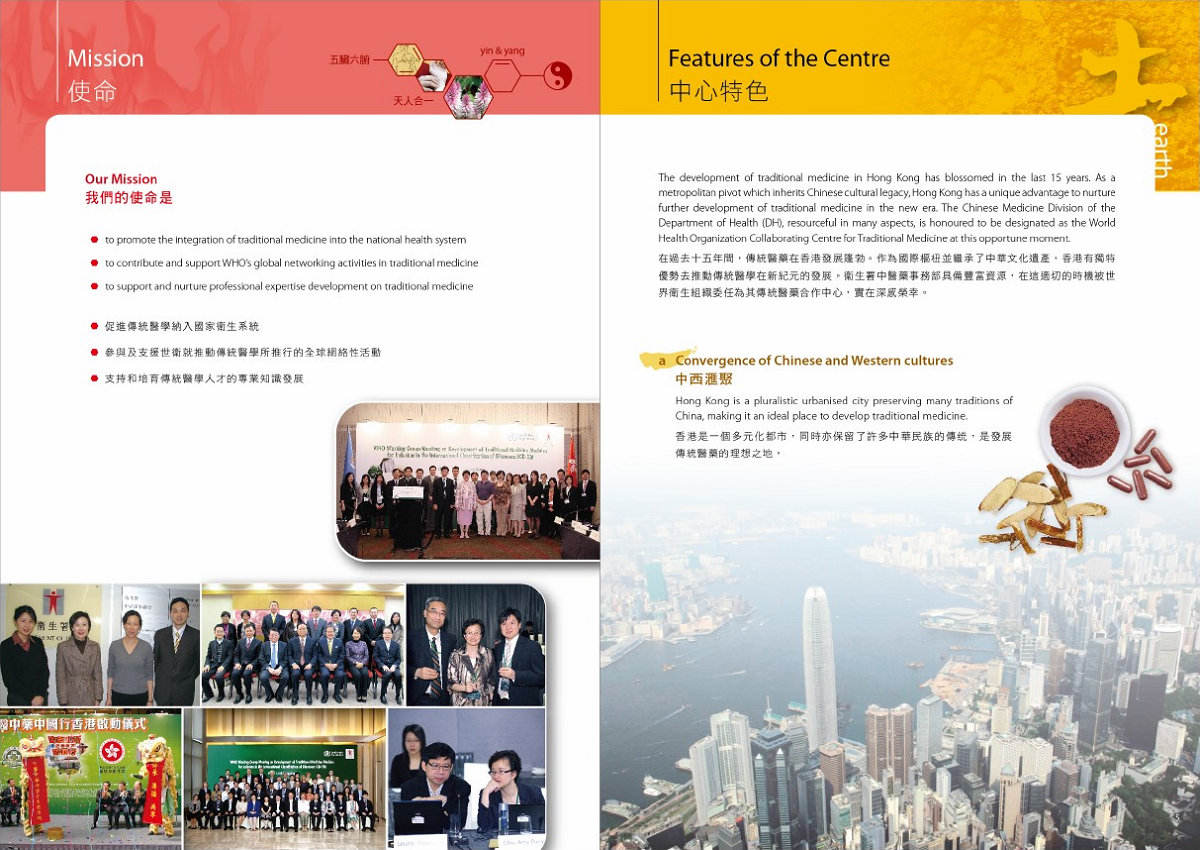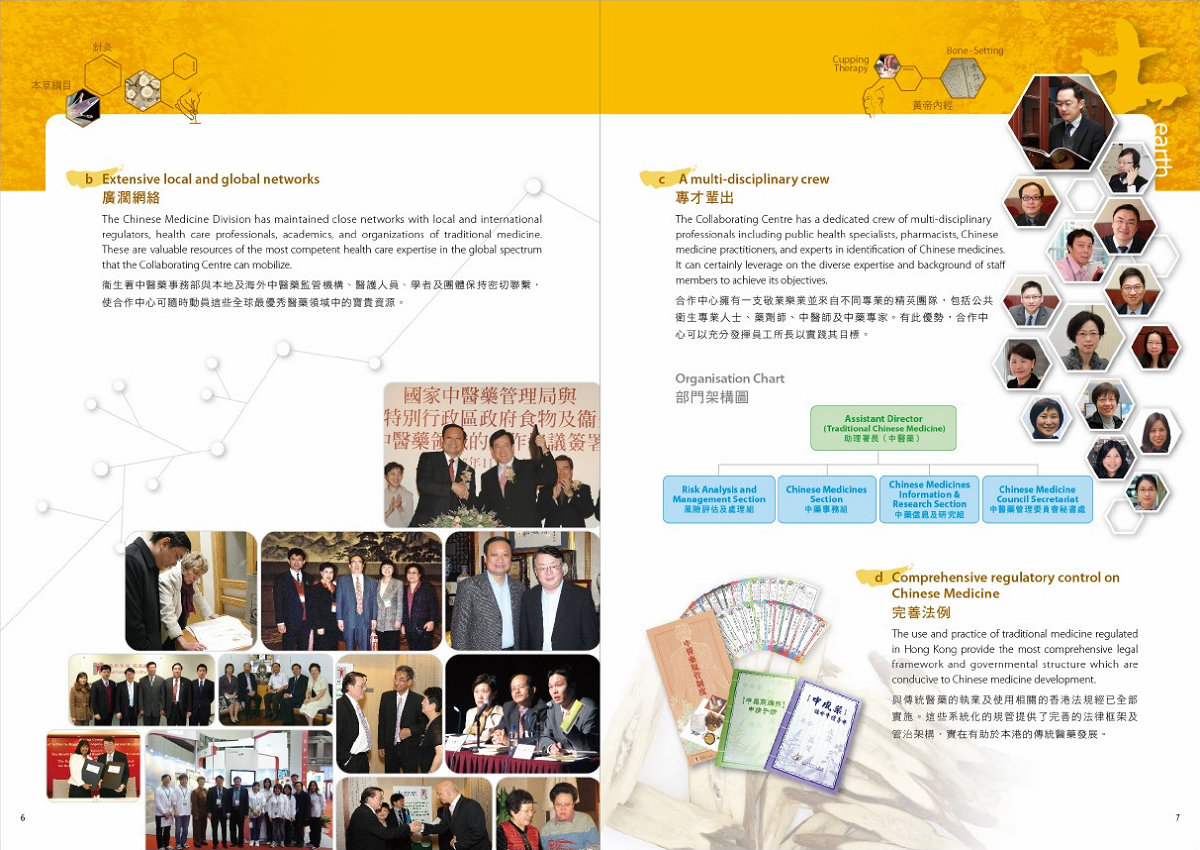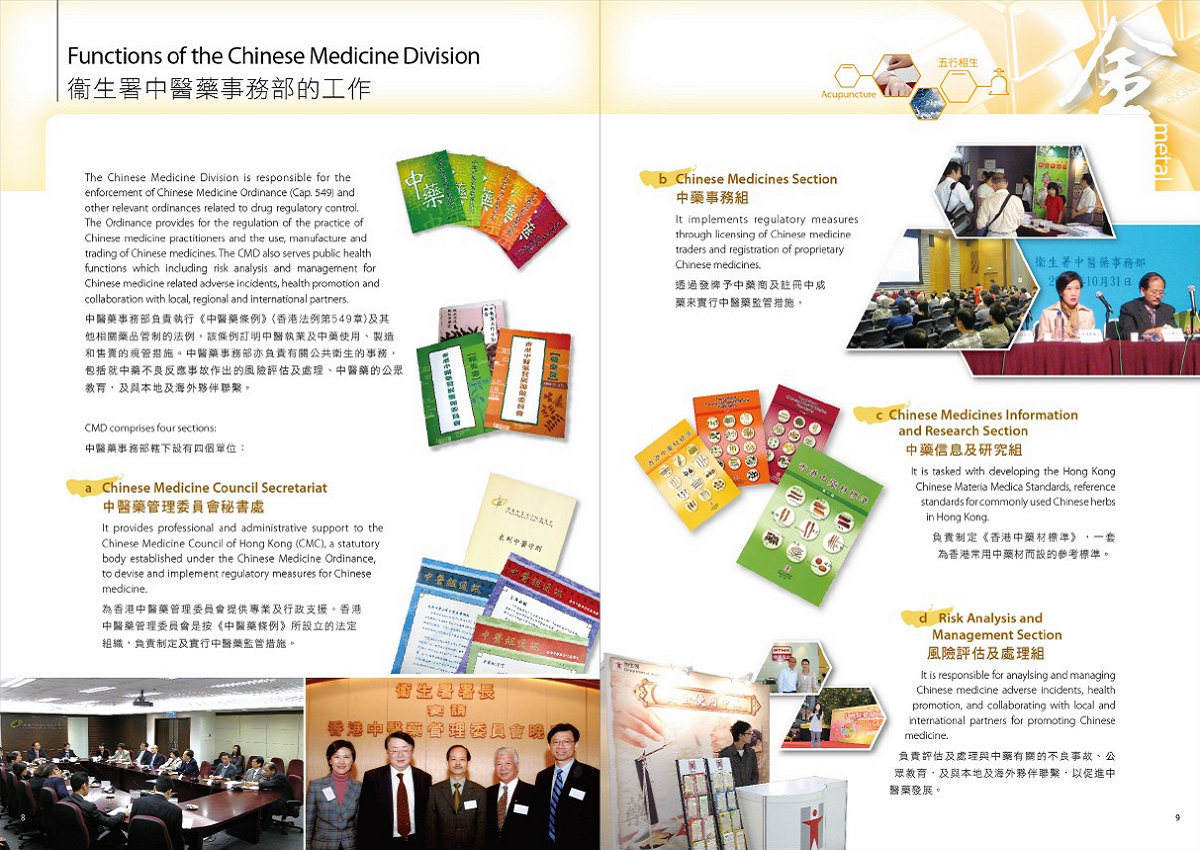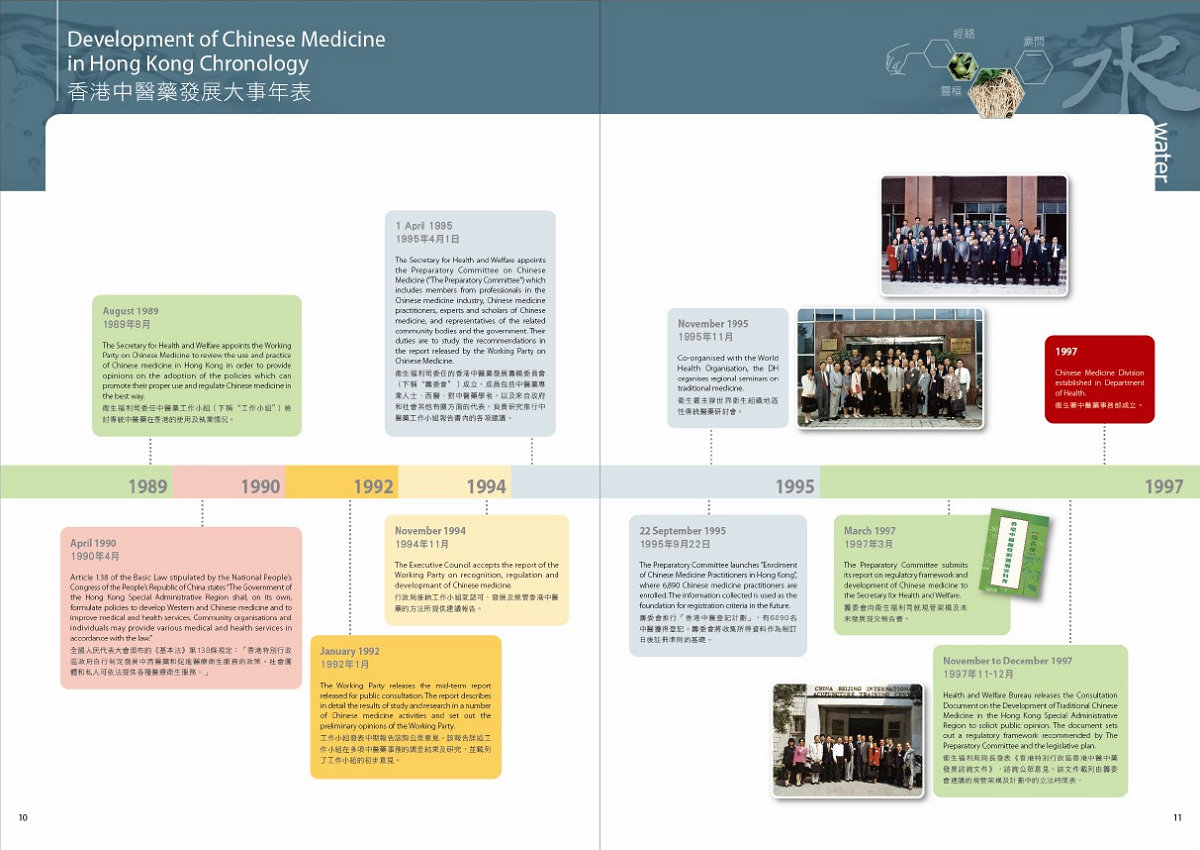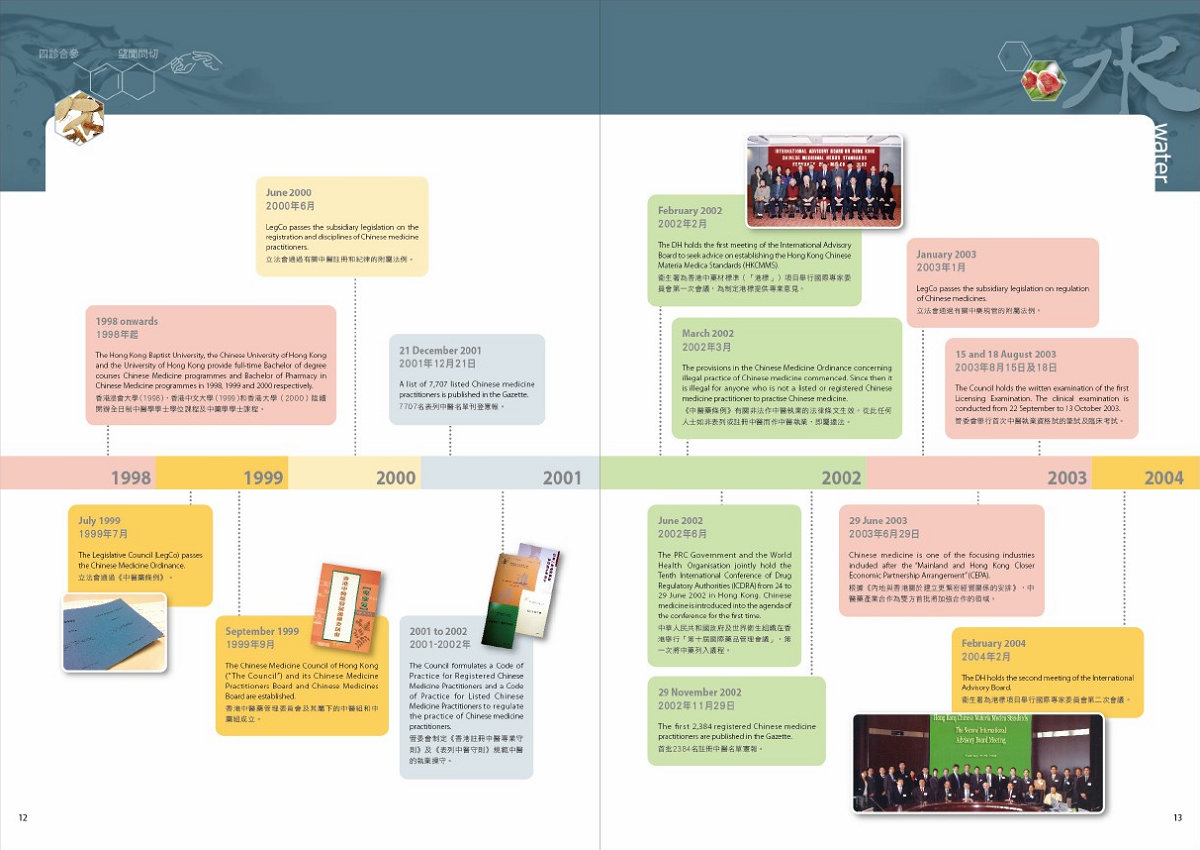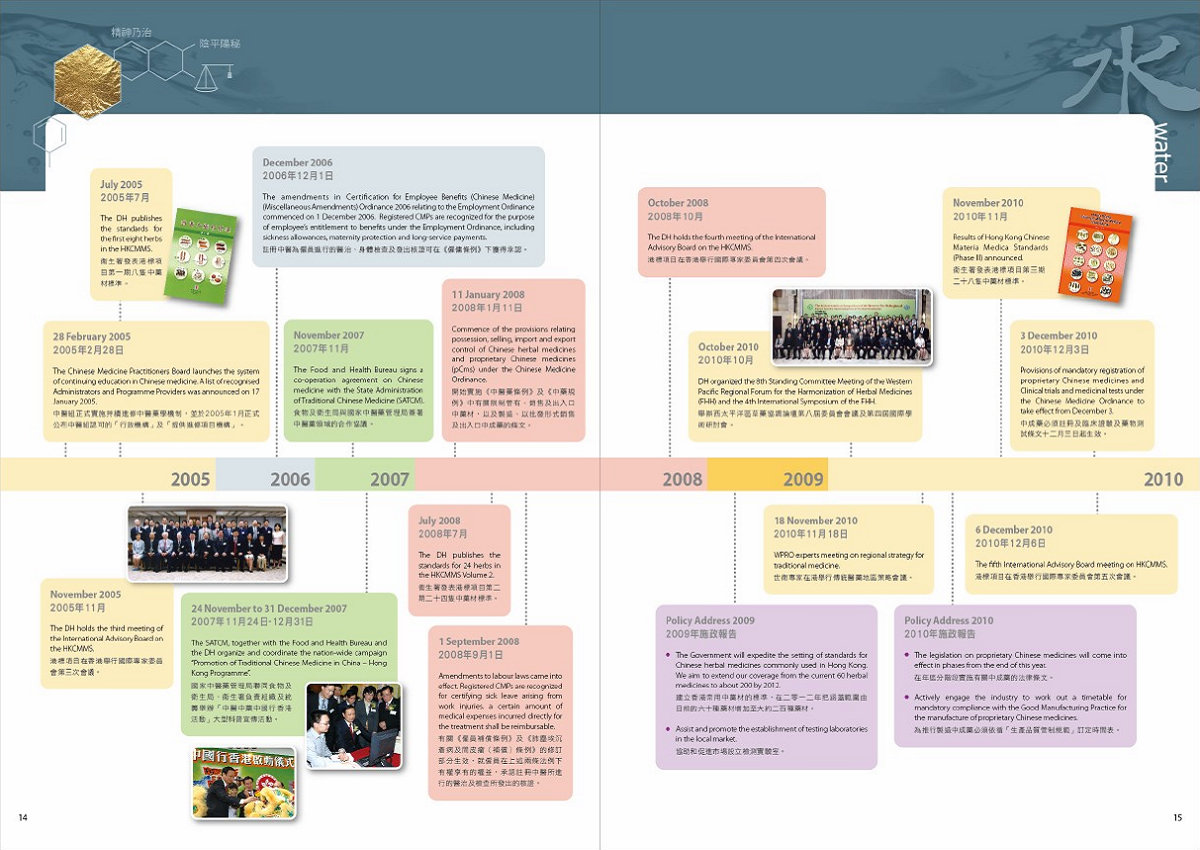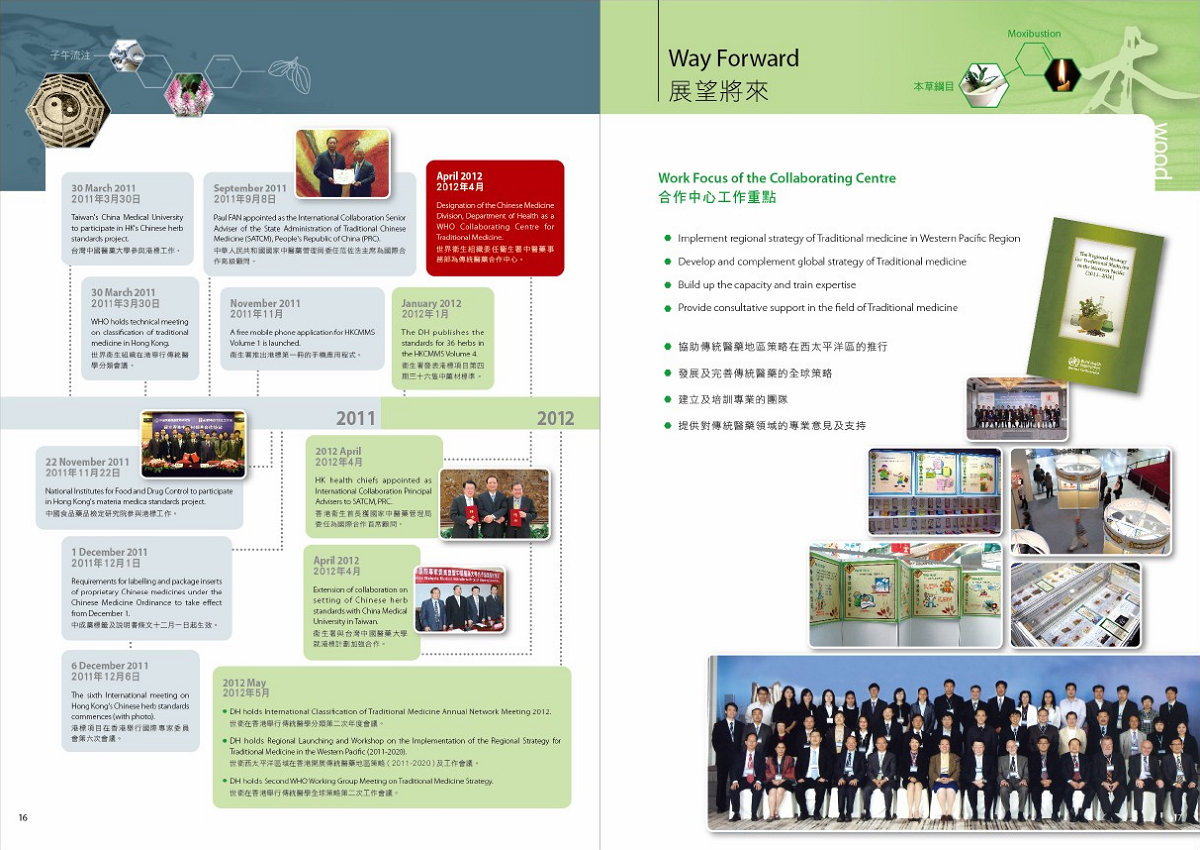Chinese Medicine Regulatory Office
Site Menu
World Health Organization Collaborating Centre for Traditional Medicine Chinese Medicine Division, Department of Health, HKSARG
Cover of World Health Organization Collaborating Centre for Traditional Medicine, Chinese Medicine Division, Department of Health, HKSARG
“Chinese Medicine Division” was renamed as “Chinese Medicine Regulatory Office” in September 2019, and its webpage is “www.cmro.gov.hk”.
Contents
- Message from the Director of Health
- Vision
- Mission
- Features of the Centre
- Functions of the Chinese Medicine Division
- Chronology
- Way Forward
Message from the Director of Health
Traditional medicine is a significant component of the health care system. Its use has always been popular in Hong Kong. Although Hong Kong is a highly urbanized city, we treasure traditional Chinese medicine as a heritage of Chinese culture. There is indeed a long history of use of traditional Chinese medicines in the local community.
Hong Kong is a city in where the essence of Chinese and western culture converges. On the one hand, Hong Kong inherits Mainland's abundant resources in Chinese medicines and superb Chinese medicine professionals. On the other hand, we possess international market sensitivity as well as rich experience in business and trade. Therefore, Hong Kong has an absolute competitive edge compared with other countries or regions. I n fact, the Department of Health has been privileged to be invited by the World Health Organization (WHO) to host various traditional medicine related events.
Leveraged on these valuable resources and experiences, I am confident that the Chinese Medicine Division of the Department of Health will continue to contribute significantly to WHO's initiatives for the global promotion and integration of traditional medicine into the national health care systems.
Message from the Director of Health
This year also marks the 15th anniversary of the Chinese Medicine Division. Now being fully equipped an elite group of professionals, at this opportune time and under the favourable environment, the designation of the Chinese Medicine Division as a WHO Collaborating Centre for Traditional Medicine represents a major developmental milestone for traditional medicine in Hong Kong.
Treading into the future always brings challenges. To keep abreast of global development, we look forward to working together with the other countries and places towards better quality, safety, and efficacious use and practice of traditional medicine.
Dr LAM Ping-Yan, Director of Health, May 2012
Vision
Our Vision is to become a global centre of excellence on traditional medicine via setting up the World Health Organization (WHO) Collaborating Centre for Traditional Medicine.
Our Mission
- to promote the integration of traditional medicine into the national health system
- to contribute and support WHO's global networking activities in traditional medicine
- to support and nurture professional expertise development on traditional medicine
Features of the Centre
The development of traditional medicine in Hong Kong has blossomed in the last 15 years. As a metropolitan pivot which inherits Chinese cultural legacy, Hong Kong has a unique advantage to nurture further development of traditional medicine in the new era. The Chinese Medicine Division of the Department of Health (DH), resourceful in many aspects, is honoured to be designated as the World Health Organization Collaborating Centre for Traditional Medicine at this opportune moment.
A. Convergence of Chinese and Western cultures
Hong Kong is a pluralistic urbanised city preserving many traditions of China, making it an ideal place to develop traditional medicine
Our Mission
- to promote the integration of traditional medicine into the national health system
- to contribute and support WHO's global networking activities in traditional medicine
- to support and nurture professional expertise development on traditional medicine
Features of the Centre
The development of traditional medicine in Hong Kong has blossomed in the last 15 years. As a metropolitan pivot which inherits Chinese cultural legacy, Hong Kong has a unique advantage to nurture further development of traditional medicine in the new era. The Chinese Medicine Division of the Department of Health (DH), resourceful in many aspects, is honoured to be designated as the World Health Organization Collaborating Centre for Traditional Medicine at this opportune moment.
A. Convergence of Chinese and Western cultures
Hong Kong is a pluralistic urbanised city preserving many traditions of China, making it an ideal place to develop traditional medicine
Features of the Centre
B. Extensive local and global networks
The Chinese Medicine Division has maintained close networks with local and international regulators, health care professionals, academics, and organizations of traditional medicine These are valuable resources of the most competent health care expertise in the global spectrum that the Collaborating Centre can mobilize.
C. A multi-disciplinary crew
The Collaborating Centre has a dedicated crew of multi-disciplinary professionals including public health specialists, pharmacists, Chinese medicine practitioners, and experts in identification of Chinese medicines It can certainly leverage on the diverse expertise and background of staff members to achieve its objectives.
D. Comprehensive regulatory control on Chinese Medicine
The use and practice of traditional medicine regulated in Hong Kong provide the most comprehensive legal framework and governmental structure which are conducive to Chinese medicine development.
Functions of the Chinese Medicine Division
The Chinese Medicine Division is responsible for the enforcement of Chinese Medicine Ordinance (Cap. 549) and other relevant ordinances related to drug regulatory control. The Ordinance provides for the regulation of the practice of Chinese medicine practitioners and the use, manufacture and trading of Chinese medicines. The CMD also serves public health functions which including risk analysis and management for Chinese medicine related adverse incidents, health promotion and collaboration with local, regional and international partne.
CMD comprises four sections
A. Chinese Medicine Council Secretariat
It provides professional and administrative support to the Chinese Medicine Council of Hong Kong (CMC), a statutory body established under the Chinese Medicine Ordinance, to devise and implement regulatory measures for Chinese medicine.
B. Chinese Medicines Section
It implements regulatory measures through licensing of Chinese medicine traders and registration of proprietary Chinese medicines.
C. Chinese Medicines Information and Research Section
It is tasked with developing the Hong Kong Chinese Materia Medica Standards. reference standards for commonly used Chinese herbs in Hong Kong.
D. Risk Analysis and Management Section
It is responsible for anaylsing and managing Chinese medicine adverse incidents, health promotion, and collaborating with local and international partners for promoting Chinese medicine.
Development of Chinese Medicine in Hong Kong Chronology
- August 1989. The Secretary for Health and Welfare appoints the Working Party on Chinese Medicine to review the use and practice of Chinese medicine in Hong Kong in order to provide opinions on the adoption of the policies which can promote their proper use and regulate Chinese medicine in the best way
- April 1990. Article 138 of the Basic Law stipulated by the National People's Congress of the People's Republic of China states 'The Govern ment of the Hong Kong Special Administrative Region shall, on its own, formulate policies to develop Western and Chinese medicine and to improve medical and health services. Community organisations and individuals may provide various medical and health services in accordance with the law."
- January 1992. The Working Party releases the mid-term report released for public consultation. The report describes in detail the results of study and research in a number of Chinese medicine activities and set out the preliminary opinions of the Working Party.
- November 1994. The Executive Council accepts the report of the Working Party on recognition, regulation and developmant of Chinese medicine.
- 1 April 1995. The Secretary for HeaIth and Welfare appoints the Preparatory Committee on Chinese Medicine ('The Preparatory Committee") which includes members from professionals in the Chinese medicine industry, Chinese medicine practitioners, experts and scholars of Chinese medicine, and representatives of the related community bodies and the government. Their duties are to study the recommendations in the report released by the Working Party on Chinese Medicine.
- 22 September 1995. The Preparatory Committee launches "Enrolment of Chinese Medicine Practitioners in Hong Kong", where 6,890 Chinese medicine practitioners are enrolled. The information collected is used as the foundation for registration criteria in the future.
- November 1995. Co-organised with the World Health Organisation, the DH organises regional seminars on traditiona I medicine.
- March 1997. The Preparatory Committee submits its report on regulatory framework and development of Chinese medicine to the Secretary for Health and Welfa.
- November to December 1997. Health and Welfare Bureau releases the Consultation Document on the Development of Traditional Chinese Medicine in the Hong Kong Special Administrative Region to solicit public opinion. The document sets out a regulatory framework recommended by The Preparatory Committee and the legislative plan.
- 1997. Chinese Medicine Division established in Department of Health.
Development of Chinese Medicine in Hong Kong Chronology
- 1998 onwards. The Hong Kong Baptist University, the Chinese University of Hong Kong and the University of Hong Kong provide fu II-time Bachelor of degree courses Chinese Medicine programmes and Bachelor of Pharmacy in Chinese Medicine programmes in 1998,1999 and 2000 respectively.
- July 1999. The Legislative Council (LegCo) passes the Chinese Medicine Ordinance.
- September 1999. The Chinese Medicine Council of Hong Kong ("The Council") and its Chinese Medicine Practitioners Board and Chinese Medicines Board are established.
- June 2000. LegCo passes the subsidiary legislation on the registration and disciplines of Chinese medicine practitioners.
- 21 December 2001. A list of 7,707 listed Chinese medicine practitioners is published in the Gazette.
- 2001 to 2002. The Council formulates a Code of Practice for Registered Chinese Medicine Practitioners and a Code of Practice for Listed Chinese Medicine Practitioners to regulate the practice of Chinese medicine practitioners.
- February 2002. The DH holds the first meeting of the I nternational Advisory Board to seek advice on establishing the Hong Kong Chinese Materia Medica Standards (HKCMMS).
- March 2002. The provisions in the Chinese Medicine Ordinance concerning illegal practice of Chinese medicine commenced. Since then it is illegal for anyone who is not a listed or registered Chinese medicine practitioner to practise Chinese medicine.
- June 2002. The PRC Government and the World Health Organisation joi ntly hold the Tenth International Conference of Drug Regulatory Authorities (ICDRA) from 24 to 29 June 2002 in Hong Kong. Chinese medicine is introduced into the agenda of the conference for the first time.
- 29 November 2002. The first 2,384 registered Chinese medicine practitioners are pu blished in the Gazette.
- January 2003. LegCo passes the subsidiary legislation on regulation of Chinese medicines.
- 29 June 2003. Chinese medicine is one of the focusing industries included after the "Mainland and Hong Kong Closer Economic Partnersh ip Arrangement" (CEPA).
- 15 and 18 August 2003. The Council holds the written examination of the first Licensing Examination. The clinical examination is conducted from 22 September to 13 October 2003.
- February 2004. The DH holds the second meeting of the International Advisory Board.
Development of Chinese Medicine in Hong Kong Chronology
- 28 February 2005. The Chinese Medicine Practitioners Boa rd launches the system of continuing education in Chinese medicine. A list of recognised Adm inistrators and Program me Providers was announced on 17 January 2005.
- July 2005. The DH publishes the standards for the first eight herbs in the HKCMMS.
- November 2005. The DH holds the third meeting of the International Advisory Board on the HKCMMS.
- December 2006. The amendments in Certification for Employee Benefits (Chinese Medicine) (Miscellaneous Amendments) Ordinance 2006 relating to the Employment Ordinance commenced on l December 2006. Registered CMPs are recognized for the purpose of employee's entitlement to benefits under the Employment Ordinance, including sickness allowances, maternity protection and long-service payments.
- November 2007. The Food and HeaIth Bureau signs a co-operation agreement on Chinese medicine with the State Administration of Traditional Chinese Medicine (SATCM).
- 24 November to 31 December 2007. The SATCM, together with the Food and Health Bureau and the DH organize and coordinate the nation-wide campaign "Promotion of Traditional Chinese Medicine in China - Hong Kong Programme".
- 11 January 2008. Commence of the provisions relating possession, selling, import and export control of Chinese herbal medicines and proprietary Chinese medicines (pCms) under the Chinese Medicine Ordinance.
- July 2008. The DH publishes the standards for 24 herbs in the HKCMMS Volume 2.
- 1 September 2008. Amendments to labour laws came into effect. Registered CMPs are recognized for certifying sick leave arising from work injuries. a certain amount of medical expenses incurred directly for the treatment shall be reimbursable.
- October 2008. The DH holds the fourth meeting of the International Advisory Board on the HKCMMS.
- Policy Address 2009. The Government will expedite the setting of standards for Chinese herbal medicines commonly used in Hong Kong. We aim to extend our coverage from the current 60 herbal medicines to about 200 by 2012; Assist and promote the establishment oftesting laboratories in the local market.
- October 2010. DH organized the 8th Standing Comm ittee Meeting of the Western Pacific Regional Forum for the Harmonization of Herbal Medicines (FHH) and the 4th International Symposium of the FHH.
- 18 November 2010. WPRO experts meeting on regional strategy for traditional medicine.
- Policy Address 2010. The legislation on proprietary Chinese medicines will come into effect in phases from the end of this year; Actively engage the industry to work out a timetable for mandatory compliance with the Good Manufacturing Practice for the manufacture of proprietary Chinese medicines.
- November 2010. Results of Hong Kong Chinese Materia Medica Standards (Phase III) announced.
- 3 December 2010. Provisions of mandatory registration of proprietary Chinese medicines and Clinical trials and medicinal tests under the Chinese Medicine Ordinance to take effect from December 3.
- 6 December 2010. The fifth International Advisory Board meeting on HKCMMS.
Development of Chinese Medicine in Hong Kong Chronology
- 30 March 2011. Taiwan's China Medical University to participate in HK's Chinese herb standards project.
- 30 March 2011. WHO holds technical meeting on classification of traditional medicine in Hong Kong.
- 8 September 2011. Paul FAN appointed as the International Collaboration Senior Adviser of the State Administration of Traditional Chinese Medicine (SATCM), People's Republic of China (PRC).
- November 2011. A free mobile phone application for HKCMMS Volume 1 is launched.
- 22 November 2011. National I nstitutes for Food and Drug Control to participate in Hong Kong's materia medica standards project.
- 1 December 2011. Requirements for labelling and package inserts of proprietary Chinese medicines under the Chinese Medicine Ordinance to take effect from December 1.
- 6 December 2011. The sixth International meeting on Hong Kong's Chinese herb standards commences (with photo).
- January 2012. The DH publishes the standards for 36 herbs in the HKCMMS Volume 4.
- April 2012. Designation of the Chinese Medicine Division, Department of Health as a WHO Collaborating Centre for Traditional Medicine.
- April 2012. HK health chiefs appointed as International Collaboration Principal Advisers to SATCM, PRC
- April 2012. Extension of collaboration on setting of Chinese herb standards with China Medical University in Taiwan.
- May 2012. DH holds International Classification ofTraditional Medicine Annual Network Meeting 2012; DH holds Regional Launching and Workshop on the Implementation of the Regional Strategy for Traditional Medicine in the Western Pacific (2011-2020); DH holds Second WHO Working Group Meeting on Traditional Medicine Strategy.
Way Forward
Work Focus of the Collaborating Centre
- Implement regional strategy of Traditional medicine in Western Pacific Region
- Develop and complement global strategy of Traditional medicine
- Build up the capacity and train expertise
- Provide consultative support in the field of Traditional medicine
